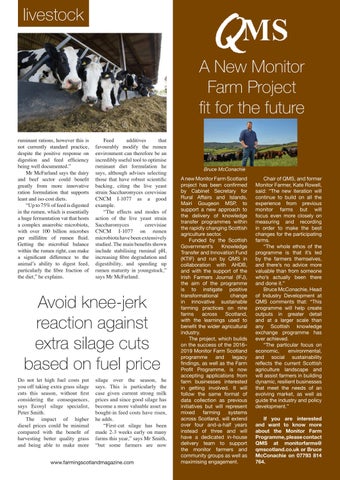livestock A New Monitor Farm Project fit for the future ruminant rations, however this is not currently standard practice, despite the positive response on digestion and feed efficiency being well documented.” Mr McFarland says the dairy and beef sector could benefit greatly from more innovative ration formulation that supports least and iso-cost diets. “Up to 75% of feed is digested in the rumen, which is essentially a huge fermentation vat that hosts a complex anaerobic microbiota, with over 100 billion microbes per millilitre of rumen fluid. Getting the microbial balance within the rumen right, can make a significant difference to the animal’s ability to digest feed, particularly the fibre fraction of the diet,” he explains.
Feed additives that favourably modify the rumen environment can therefore be an incredibly useful tool to optimise ruminant diet formulation he says, although advises selecting those that have robust scientific backing, citing the live yeast strain Saccharomyces cerevisiae CNCM I-1077 as a good example. “The effects and modes of action of the live yeast strain Saccharomyces cerevisiae CNCM I-1077 on rumen microbiota have been extensively studied. The main benefits shown include stabilising ruminal pH, increasing fibre degradation and digestibility, and speeding up rumen maturity in youngstock,” says Mr McFarland.
Avoid knee-jerk reaction against extra silage cuts based on fuel price Do not let high fuel costs put you off taking extra grass silage cuts this season, without first considering the consequences, says Ecosyl silage specialist, Peter Smith. The impact of higher diesel prices could be minimal compared with the benefit of harvesting better quality grass and being able to make more
silage over the season, he says. This is particularly the case given current strong milk prices and since good silage has become a more valuable asset as bought-in feed costs have risen, he adds. “First-cut silage has been made 2-3 weeks early on many farms this year,” says Mr Smith, “but some farmers are now
www.farmingscotlandmagazine.com
Bruce McConachie
A new Monitor Farm Scotland project has been confirmed by Cabinet Secretary for Rural Affairs and Islands, Mairi Gougeon MSP, to support a new approach to the delivery of knowledge transfer programmes within the rapidly changing Scottish agriculture sector. Funded by the Scottish Government’s Knowledge Transfer and Innovation Fund (KTIF) and run by QMS in collaboration with AHDB, and with the support of the Irish Farmers Journal (IFJ), the aim of the programme is to instigate positive transformational change in innovative sustainable farming practices on nine farms across Scotland, with the learnings used to benefit the wider agricultural industry. The project, which builds on the success of the 2016– 2019 Monitor Farm Scotland programme and legacy findings, as well as the Farm Profit Programme, is now accepting applications from farm businesses interested in getting involved. It will follow the same format of data collection as previous initiatives but will represent mixed farming systems across Scotland, will extend over four and-a-half years instead of three and will have a dedicated in-house delivery team to support the monitor farmers and community groups as well as maximising engagement.
Chair of QMS, and former Monitor Farmer, Kate Rowell, said: “The new iteration will continue to build on all the experience from previous monitor farms but will focus even more closely on measuring and recording in order to make the best changes for the participating farms. “The whole ethos of the programme is that it’s led by the farmers themselves, and there’s no advice more valuable than from someone who’s actually been there and done it.” Bruce McConachie, Head of Industry Development at QMS comments that: “This programme will help create outputs in greater detail and at a larger scale than any Scottish knowledge exchange programme has ever achieved. “The particular focus on economic, environmental, and social sustainability reflects the current Scottish agriculture landscape and will assist farmers in building dynamic, resilient businesses that meet the needs of an evolving market, as well as guide the industry and policy development.” If you are interested and want to know more about the Monitor Farm Programme, please contact QMS at monitorfarms@ qmscotland.co.uk or Bruce McConachie on 07793 814 764.

















































